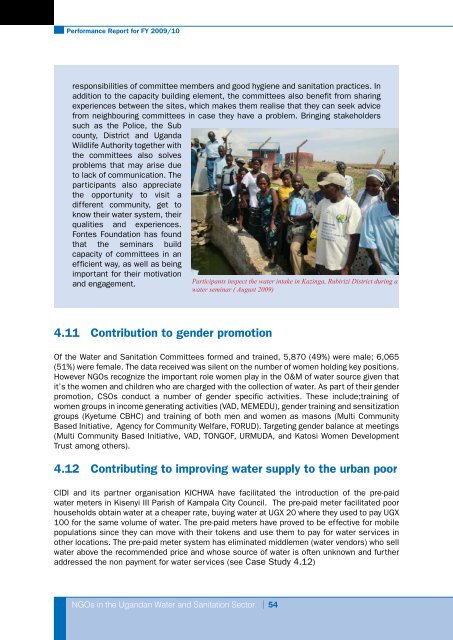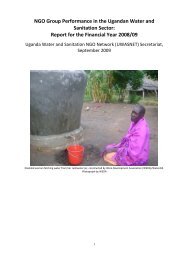Performance Report for FY 2009/10 - UWASNET
Performance Report for FY 2009/10 - UWASNET
Performance Report for FY 2009/10 - UWASNET
You also want an ePaper? Increase the reach of your titles
YUMPU automatically turns print PDFs into web optimized ePapers that Google loves.
<strong>Per<strong>for</strong>mance</strong> <strong>Report</strong> <strong>for</strong> <strong>FY</strong> <strong>2009</strong>/<strong>10</strong><br />
responsibilities of committee members and good hygiene and sanitation practices. In<br />
addition to the capacity building element, the committees also benefit from sharing<br />
experiences between the sites, which makes them realise that they can seek advice<br />
from neighbouring committees in case they have a problem. Bringing stakeholders<br />
such as the Police, the Sub<br />
county, District and Uganda<br />
Wildlife Authority together with<br />
the committees also solves<br />
problems that may arise due<br />
to lack of communication. The<br />
participants also appreciate<br />
the opportunity to visit a<br />
different community, get to<br />
know their water system, their<br />
qualities and experiences.<br />
Fontes Foundation has found<br />
that the seminars build<br />
capacity of committees in an<br />
efficient way, as well as being<br />
important <strong>for</strong> their motivation<br />
and engagement.<br />
4.11 Contribution to gender promotion<br />
Of the Water and Sanitation Committees <strong>for</strong>med and trained, 5,870 (49%) were male; 6,065<br />
(51%) were female. The data received was silent on the number of women holding key positions.<br />
However NGOs recognize the important role women play in the O&M of water source given that<br />
it’s the women and children who are charged with the collection of water. As part of their gender<br />
promotion, CSOs conduct a number of gender specific activities. These include;training of<br />
women groups in income generating activities (VAD, MEMEDU), gender training and sensitization<br />
groups (Kyetume CBHC) and training of both men and women as masons (Multi Community<br />
Based Initiative, Agency <strong>for</strong> Community Welfare, FORUD). Targeting gender balance at meetings<br />
(Multi Community Based Initiative, VAD, TONGOF, URMUDA, and Katosi Women Development<br />
Trust among others).<br />
4.12 Contributing to improving water supply to the urban poor<br />
CIDI and its partner organisation KICHWA have facilitated the introduction of the pre-paid<br />
water meters in Kisenyi III Parish of Kampala City Council. The pre-paid meter facilitated poor<br />
households obtain water at a cheaper rate, buying water at UGX 20 where they used to pay UGX<br />
<strong>10</strong>0 <strong>for</strong> the same volume of water. The pre-paid meters have proved to be effective <strong>for</strong> mobile<br />
populations since they can move with their tokens and use them to pay <strong>for</strong> water services in<br />
other locations. The pre-paid meter system has eliminated middlemen (water vendors) who sell<br />
water above the recommended price and whose source of water is often unknown and further<br />
addressed the non payment <strong>for</strong> water services (see Case Study 4.12)<br />
NGOs in the Ugandan Water and Sanitation Sector | 54<br />
Participants inspect the water intake in Kazinga, Rubirizi District during a<br />
water seminar ( August <strong>2009</strong>)



